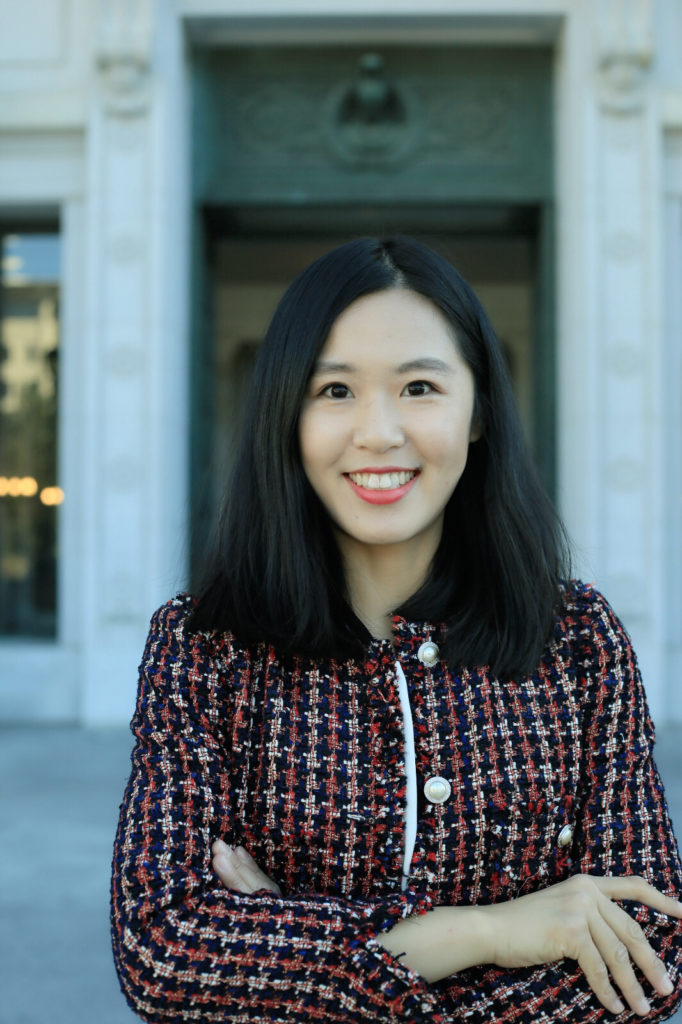Renyuan Xu: “There is always uncertainty in life”
When IEOR PhD student Renyuan Xu was a kid growing up in Jinan, China, she found herself very curious about the future, especially where there was some uncertainty involved.
“When we were kids, we sometimes had the feeling that something may happen, something may not happen. Will it be raining tomorrow? It has some certainty that it will be raining. It has some certainty that it won’t,” Renyuan said. “It’s a concept that people use every day, but when I was young I didn’t know that we could use a rigorous probability theory to describe these things.”
As Renyuan grew older, she became more interested in probability and math and how they could explain the real world. She always loved puzzles, liked simple probability and combinatorics in math, and appreciated how they could be used to calculate the roll of a dice or draw of a card.

Her passion for math paid off in high school when she won the National Math Competition, giving her automatic admission to study at the University of Science and Technology of China, where she earned a bachelor’s degree in computational and applied mathematics. While in college, she grew more immersed in mathematics and even helped to teach other undergraduates in advanced math courses.
After completing her B.S., she wanted to learn more, and decided to apply for PhD programs. Because she was interested in both mathematical theory and how it applied to the real world, Renyuan felt that IEOR was the perfect choice for her.
“IEOR was the right place to do this kind of interesting stuff,” said Renyuan.
When Renyuan first arrived in the IEOR department in 2014, she wasn’t sure what she wanted to do when she graduated, as she had both a deep curiosity about mathematical theory and an urge to see how it applied in the real world. One of the exciting things about IEOR is that graduates can make an impact in both academia and industry, but this also means that students must decide which path to pursue. Fortunately, Renyuan had a lot of help from her advisor, Professor Xin Guo.
“As a PhD student, the advisor plays a very important role,” said Renyuan. “I think there is a very good dynamic between myself and Prof. Guo. She encourages me a lot.”
At Berkeley, Renyuan had the opportunity to dive deeply into many areas of research, such as probability theory, game theory, optimization, and statistical learning. Quickly, Renyuan realized that she could take the insights she learned from theory and solve industry problems in novel ways.
“Sometimes if [industry has] some problems they don’t know how to solve, it’s the kind that academia might be able to help with,” said Renyuan.
Renyuan interned at Quantitative Brokers and worked with co-founder Dr. Robert Almgren — an expert in market microstructures and himself no stranger to academia, having held positions at the University of Toronto, University of Chicago, New York University, Carnegie Mellon University, and Princeton University in the past. Renyuan appreciated that he was open to research, writing papers, and understood how research could help industry.
Using skills she learned in the IEOR PhD program, Renyuan worked on a problem called “smart order routing” at the firm, where she built an optimization algorithm that allowed financial instruments traded on multiple platforms to be split in a way that maximized fulfillment for a given time period.
Besides being able to apply what she learned outside the classroom, Renyuan also led inside of it by acting as a graduate student instructor for five IEOR classes and one course held at the Haas School of Business. In addition to learning about financial engineering, economics, probability theory, and stochastic analysis, Renyuan also thought teaching was a valuable opportunity for her to work on her English.
“Being a teaching assistant, and having to explain things to students with different backgrounds — that helped a lot,” said Renyuan.
By the time she reached her third year at Berkeley, she decided that she wanted to pursue a career in academia.
“I became more confident in my ability to research and had some results I was really excited about and wanted to continue working on,” Renyuan said. “As an academic you have the freedom to do that.”
While Renyuan is pursuing an academic track after graduation and looks forward to going deeper with her research, she thinks IEOR students, especially new ones, should be open to new projects and fields as well.
“I think sometimes people are interested in something, but then after awhile, they start to lose interest,” Renyuan said. “Keep more doors open to yourself when you are starting to do research. You have experts in our department to collaborate and bring up questions to. You can still make the decision later.”
Renyuan will be concluding her PhD this year. Afterward, she will head to Oxford University, where she has secured a 1-3 year no-teaching fellowship, leaving her free to pursue her research interests. After her postdoc, she will join the faculty as a Gabilan Assistant Professor at the University of Southern California’s Daniel J. Epstein Department of Industrial & Systems Engineering, currently chaired by IEOR alumnus Professor Maged M. Dessouky.